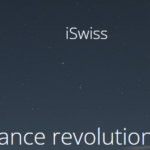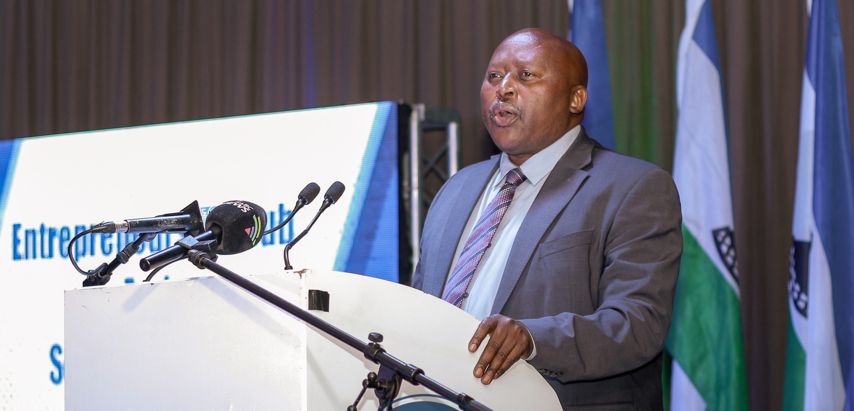…A scam-like deal collapses amid media attention
Kananelo Boloetse
A former employee of the Ministry of Trade and Industry, Business Development, and Tourism, Lesole Maleke, disclosed to Newsday this week that iSwiss first met with Minister Mokhethi Shelile upon its arrival in Lesotho earlier this year.
“I was introduced to the company by him (Shelile) and he asked me to help register it (iSwiss Company). I worked in that ministry for a very long time, about 37 years, so I know much about business registration. However, I do not work there anymore,” Maleke said.
Maleke explained that the company needed a local representative to fulfil the registration requirements in Lesotho, which led to him becoming its agent.
Shelile confirmed yesterday that he directed iSwiss to Maleke for assistance.
“I met with them in Dubai and we had a discussion on (SEZs) Special Economic Zones. When they arrived in Lesotho, they naturally came to my office first. I referred them to an available staff member to assist with their registration, and that happened to be Mr. Maleke,” he explained.
The minister emphasised that this is a common practice and noted that it was not unusual for investors to approach his office initially before being referred to the appropriate department for further assistance.
He asserted that there was nothing sinister or controversial about this process.
Last week, Newsday reported that the government plans to commit to a 99-year agreement with the supposed Swiss financial group, iSwiss, to establish Special Economic Zones (SEZs) in the country.
For a nation grappling with economic diversification, SEZs have long been touted as a potential solution.
A report on the feasibility of such zones was completed in November 2019 as part of a collaboration between the Ministry of Trade and Industry and the African Development Bank (AfDB). But what has happened since then has left many asking difficult questions.
The First Legal Registration
On May 30, 2024, iSwiss Lesotho (Pty) Ltd was incorporated, listing its business activities as accounting, bookkeeping, auditing, tax consultancy, management consultancy, and other related activities.
Christopher Aleo, an Italian, is the sole director and shareholder of the company.
Just a week later, on June 5, 2024, iSwiss Bank Ltd was also incorporated, with Aleo holding 999,999 shares and Lithuanian national, Simona Jakstaite, holding one share.
Both iSwiss Lesotho (PTY) and iSwiss Bank both share the same address listed as 12 Orpen Road, Maseru Sun Hotel & Casino, Maseru, 100, Lesotho.
According to Khaleej Times, a Dubai-based newspaper, Jakstaite is described as Aleo’s fiancée, and the two have gained media attention as a “power couple.”
Their rapid establishment of financial entities in Lesotho, linked to the potentially transformative Lesotho Special Economic Zones policy 2024-2029, has raised suspicions.
On August 20, 2024, company registry documents reveal, Lesole Maleke was appointed as the agent of Swiss Capital F.Z.E Pty Ltd, a company incorporated in the United Arab Emirates (UAE).
The company’s registered physical address is Sheikh Rashid Bin Saeed Al Maktoum Street, Ajman Free Zone, UAE, 800.
On the same day, its main business address was registered as 12 Orpen Road, Maseru Sun Hotel & Casino, Maseru, 100, Lesotho, with Christopher Aleo listed as the company’s director.
Maleke signed the consent to accept service on behalf of the external company on August 8, 2024.
Having worked in the Ministry of Trade and Industry for nearly 37 years, Maleke said his extensive experience made him the natural choice to assist with the registration process.
“They needed someone who is based in Lesotho and has a physical address in the country to register the company. That’s why I became the agent,” he added.
Mokhethi Shelile has served as Lesotho’s Minister of Trade and Industry, Business Development, and Tourism since 2022.
The Exposé
On Thursday, October 17, 2024, the Ministry of Trade and Industry invited stakeholders to validate the “final draft” Lesotho Special Economic Zones (SEZ) policy for 2024-2029.
This controversial document, which reads more like a contract than a developmental framework, explicitly names iSwiss as the government’s exclusive partner to establish SEZs in Lesotho.
Last week, Newsday reported that the government aims to commit to a 99-year agreement with iSwiss, a supposed Swiss financial group, for the development of these SEZs.
According to the draft policy, the Government of Lesotho (GoL) and iSwiss would establish a joint venture, with the government holding a 25 percent stake and iSwiss retaining the remaining 75 percent.
The draft further stipulates that this joint venture would have exclusive rights to create and manage the SEZs, in compliance with local laws.
iSwiss, an international financial conglomerate based in Switzerland, according to the policy document, operates under various names, including iSwiss, Legal Credit, iSwiss Insurance, iSwiss Bank, iSwiss Pay, iSwiss Securities, and Alva Fin, among others.
However, on Tuesday this week, the ministry’s public relations officer, Lihaelo Nkaota, issued a statement refuting parts of the Newsday article.
Nkaota stated: “The recent article published by Newsday newspaper dated 18-24th October falsely claims that the government has signed a 99-year deal with iSwiss. This information is incorrect. No such deal has been signed by the government.”
She further clarified that the meeting on October 17, 2024, was not to validate the SEZ policy but rather to deliberate on the feasibility study with business associations and other stakeholders.
She added that the ministry had not yet adopted any SEZ policy.
Newsday responded by affirming that while formal validation may not have occurred, the fact remains that stakeholders were invited to validate the policy.
The publication argued that had the draft policy been validated, it would have moved to the next stage, potentially binding the government to the commitments outlined in the document, including obligations toward iSwiss.
On Wednesday morning, Minister Mokhethi Shelile held a press conference to address the ongoing controversy surrounding the draft SEZ policy.
Shelile reiterated that the meeting on October 17 was not intended to validate the document. However, when pressed by reporters, he conceded that the meeting was indeed called to validate the document, attributing this to an error on the ministry’s part.
In a move that seemed to distance the ministry from the draft, Shelile stated: “I could have written the document, but if the ministry has not adopted it, we cannot say it is the ministry’s document. The ministry has not adopted that document.”
He then added, somewhat contradictorily, that the draft is “a document being exchanged among tables in the ministry” but emphasised that it cannot be considered an official ministry document.
Essentially, the minister’s comments left the impression that the draft policy is a mysterious document, with no one taking responsibility for its origins or formal status.
The Big Admission
When asked how iSwiss was selected as the government’s potential partner for the SEZs and whether there had been a competitive bidding process, Shelile confirmed that the company had submitted an unsolicited proposal.
He also acknowledged that the ministry had been in discussions with iSwiss but hinted at talks with other unnamed companies, though he declined to provide further details about these other companies.
In a press statement on Wednesday, Newsday challenged the ministry to explain to the nation how it came to draft a document that was meant to become government policy, and explicitly named a specific company—iSwiss—if there was no form of engagement or arrangement with that company.
The publication said it was highly improbable that the ministry randomly selected iSwiss from a pool of every existing company in the world to be included in the draft policy.
The press statement read: “The Ministry must explain how this particular company was chosen to be named in such an important draft document. It raises serious questions that demand clarity: Was there a formal process involved in selecting iSwiss, or was the mention of this company the result of some other engagement?”
It added: “The Ministry should also clarify whether iSwiss itself would be taken aback to learn that its name was featured in a draft policy document. The nation deserves to know whether the inclusion of this company’s name was legitimate and grounded in any form of agreement or collaboration, or if this entire situation was done without the company’s consent.”

Who are iSwiss, Christopher Aleo, and Simona Jakstaite?
A quick dive into the digital world to investigate iSwiss, its sole shareholder, and CEO, Christopher Aleo, reveals limited and unclear information about the company and its leadership.
Aleo is primarily described by Google as an “Internet Personality,” with his background being largely unrelated to finance. Instead, his public profile highlights his interests as a fashion enthusiast and aspiring film producer. One online description claims: “Christopher Aleo, President of iSwiss Bank, makes a grand entrance into the film industry as a producer at the 81st Venice Film Festival. Known for his groundbreaking contributions to finance, Aleo now combines his economic expertise with cinematic artistry through iSwiss Films.”
This information, however, originates from Instagram, a platform where Aleo’s image as a CEO seems to lean more towards lifestyle and fashion rather than serious banking or financial services.
Similarly, Aleo’s fiancée, Simona Jakstaite, is also listed by Google as an “Internet Personality” with little substantial information available. Like Aleo, Jakstaite’s public presence seems to be more rooted in social media rather than any notable professional or business background.
In an attempt to verify the existence and competence of iSwiss, Newsday dug deeper but found limited available information. There is no Wikipedia page detailing the company’s history or legitimacy. The iSwiss website, which may be associated with Aleo, offers minimal information, with access to further details locked behind a restricted interface.
The couple frequently appears on various websites, both reputable and dubious, attending global events such as fashion shows and film festivals. Their lavish lifestyle is well-documented on Instagram, a platform commonly associated with influencers and, at times, scammers.
This raises questions about the authenticity and credibility of their claimed ventures, especially in the banking and finance sector.
Summary
- Last week, Newsday reported that the government plans to commit to a 99-year agreement with the supposed Swiss financial group, iSwiss, to establish Special Economic Zones (SEZs) in the country.
- A report on the feasibility of such zones was completed in November 2019 as part of a collaboration between the Ministry of Trade and Industry and the African Development Bank (AfDB).
- “They needed someone who is based in Lesotho and has a physical address in the country to register the company.

Your Trusted Source for News and Insights in Lesotho!
At Newsday Media, we are passionate about delivering accurate, timely, and engaging news and multimedia content to our diverse audience. Founded with the vision of revolutionizing the media landscape in Lesotho, we have grown into a leading hybrid media company that blends traditional journalism with innovative digital platforms.








